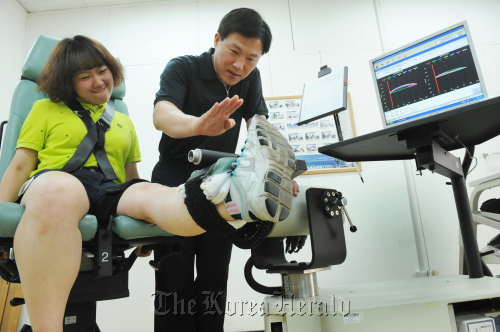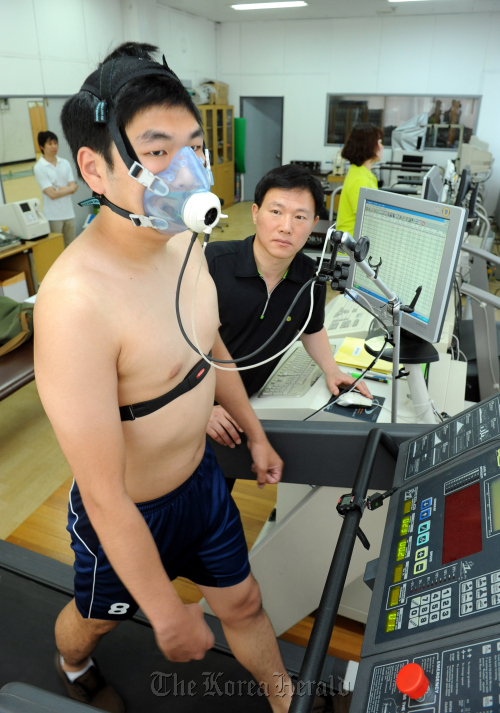Sports science team supports Korean athletes for Daegu worlds
It was 4 p.m. on Tuesday and a female athlete was nervously sitting on a strange looking chair in a lab with one of her legs strapped into a machine.
“Go! Kick your leg as fast as you can,” shouted an instructor, and the athlete followed suit with a painful look on her face.
“It’s a muscular performance test,” said Sung Bong-ju, a senior researcher of Korea Institute of Sport Science.
“With this test, we can check athletes’ leg balance and possible injuries,” he explained, looking at the graphs and data on the computer screen.
Sung is among 11 researchers from the government-affiliated organization, supporting the national athletics team.
Daegu, about 300 kilometers south of Seoul, is preparing for the country’s first ever World Athletics Championships, which is slated for Aug. 27-Sept. 4.
With the World Championships only two months away, the Korean national athletics team is now putting its faith in the lab to boost its chance of success at the upcoming home event.
“We’ve long been working with various sports, but this is the first time that we focus on supporting and improving track and field athletes,” said Sung.
Korea Institute of Sport Science located near the Taeneung National Training Center in Nowon-gu, Seoul, has been a stepping stone for sports development in Korea since its establishment in 1980. The KISS has developed up-to-date scientific programs to support professional athletes, providing scientific training methods and technical information.

It was 4 p.m. on Tuesday and a female athlete was nervously sitting on a strange looking chair in a lab with one of her legs strapped into a machine.
“Go! Kick your leg as fast as you can,” shouted an instructor, and the athlete followed suit with a painful look on her face.
“It’s a muscular performance test,” said Sung Bong-ju, a senior researcher of Korea Institute of Sport Science.
“With this test, we can check athletes’ leg balance and possible injuries,” he explained, looking at the graphs and data on the computer screen.
Sung is among 11 researchers from the government-affiliated organization, supporting the national athletics team.
Daegu, about 300 kilometers south of Seoul, is preparing for the country’s first ever World Athletics Championships, which is slated for Aug. 27-Sept. 4.
With the World Championships only two months away, the Korean national athletics team is now putting its faith in the lab to boost its chance of success at the upcoming home event.
“We’ve long been working with various sports, but this is the first time that we focus on supporting and improving track and field athletes,” said Sung.
Korea Institute of Sport Science located near the Taeneung National Training Center in Nowon-gu, Seoul, has been a stepping stone for sports development in Korea since its establishment in 1980. The KISS has developed up-to-date scientific programs to support professional athletes, providing scientific training methods and technical information.


“We provide consultation for each sports event, measuring and evaluating various aspects of each athlete and team,” said Sung.
According to him, there are currently 22 researchers in the institution working with Korean national team athletes, and 11 of them are designated for preparing the Dague World Championships.
The 11-member team consists of experts in training, physiotherapy, performance analysis and psychology. And they have been monitoring, researching and analyzing the athletes, and providing scientific tips to enhance their performance since 2008.
To fully understand the movements and power techniques of athletes, the KISS has installed three dimensional motion-capture cameras, video analysis software, devices for measuring muscle strength and a variety of other technologies.
“It’s an intensive scientific approach that Korean athletes have never had before,” claimed Sung, who has been overseeing physical strength of the athletes. He is currently working as a special adviser to Kim Deok-hyeon, the national triple-jumper.
The researcher highlighted, in particular, that the 3-D analysis can be used to identify flaws that could lead to injuries, and can also be used to improve techniques.
“Triple jumpers, for instance, need speed, leg power and also the right coordination to hop from one leg to the other before take off. I’m working with Kim together to find how to maintain speed, and what’s the best knee angle for him to get the best result through the video analysis,” the researcher said.
He admitted, however, when they first started the project, the athlete did not really expect much from sports science. But the situation has changed after the researchers helped the Korean athletic team claim four gold medals in the 2010 Asian Games.
“Athletes now start believing it, and they come to us and ask ‘I want to get better and what do I need to change?”
Sung added that the sport science team is now focusing on four disciplines ― triple jump, pole vault, hurdles and javelin throw ― in which it believes Korean athletes can have some success at the upcoming World Championships.
“We still need more time to be able to compete in the world level in 100m or 200m, but we have some chances in those technical events,” he said, noting, in particular, that triple jumper Kim is one to watch.
“He holds a national record of 17.20m, and is now aiming for 17.50m at Daegu. I believe he can make it if he can keep his form until the competition,” he said.
“We now meet athletes at least once a week for physical and technical testing. We’re making our final pitch help Korean athletes get ready for the upcoming Daegu World Championships,” he said.
But the researcher claimed that the important thing was not only getting good results at the competition but to continue to support the athletes afterwards.
“It is important to support athletics events as they are fundamentals of all sports,” he added.
By Oh Kyu-wook (596story@heraldcorp.com)



![[Herald Interview] 'Amid aging population, Korea to invite more young professionals from overseas'](http://res.heraldm.com/phpwas/restmb_idxmake.php?idx=644&simg=/content/image/2024/04/24/20240424050844_0.jpg&u=20240424200058)







![[Hello India] Hyundai Motor vows to boost 'clean mobility' in India](http://res.heraldm.com/phpwas/restmb_idxmake.php?idx=644&simg=/content/image/2024/04/25/20240425050672_0.jpg&u=)






![[Today’s K-pop] NewJeans' single teasers release amid intrigue](http://res.heraldm.com/phpwas/restmb_idxmake.php?idx=642&simg=/content/image/2024/04/26/20240426050575_0.jpg&u=)